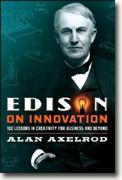Edison on Innovation
Alan Axelrod
book reviews:
· general fiction
· chick lit/romance
· sci-fi/fantasy
· graphic novels
· nonfiction
· audio books
· author interviews
· children's books @
curledupkids.com
· DVD reviews @
curledupdvd.com
newsletter
win books
buy online
links
home
for authors
& publishers
for reviewers

 |
Edison on Innovation: 102 Lessons in Creativity for Business and Beyond Alan Axelrod Jossey-Bass Hardcover 192 pages February 2008 |
|
Thomas Edison did not consider himself a genius, but rather a person who thought about how to improve something or do it better: he was an innovator. Most of the time, his inventions came about by accident while researching some other project. He holds the record number of patents for a single person at 1,093. Many of these patents dealt with improving something that already existed.
Axelrod presents Edisonís biography in the first chapter then divides the remaining 101 lessons into nine chapters:
Three appendices include a chronology of Edisonís life, 200 of his patents, and a suggested reading list, followed by an introduction to the author and an index. This book is recommended to those interested in Thomas Edison, his innovations and inventions, and to those wanting inspiration on how to improve their business life. Alan Axelrod has a Ph.D. in English from the University of Iowa. He taught at Lake Forrest College, Lake Forest, Illinois, and at Furman University, Greenville, South Carolina. He has been involved in publishing in New York City and Atlanta. He founded in 1997 The Ian Samuel Group, a creative services and book-packaging firm. He is the author of Eisenhower on Leadership (2006), co-author with General Wesley Clark of Patton: A Biography (2006), and author of Patton on Leadership (2001). He is co-editor with Christopher DePree of the Van Nostrandís Concise Encyclopedia of Science (2003). Axelrod has written articles for Business Week, Inc, and Fortune. Originally published on Curled Up With A Good Book at www.curledup.com. © Br. Benet Exton, O.S.B., 2008 |
|
|
|
 Click here to learn more about this month's sponsor! |
|
| fiction · sf/f · comic books · nonfiction · audio newsletter · free book contest · buy books online review index · links · · authors & publishers reviewers |
|
| site by ELBO Computing Resources, Inc. | |
 In the introduction to Alan Axelrodís book 102 lessons on how Edison used creativity for business and how a person today can use his example to progress in business or even life, he says to stop thinking and act like a genius - which is lesson one.
In the introduction to Alan Axelrodís book 102 lessons on how Edison used creativity for business and how a person today can use his example to progress in business or even life, he says to stop thinking and act like a genius - which is lesson one.